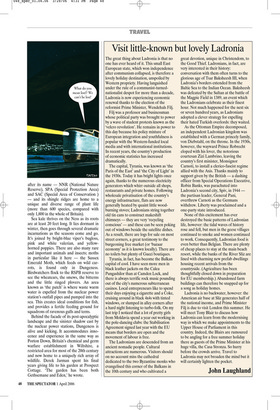Visit little-known but lovely Ladronia
The great thing about Ladronia is that no one has ever heard of it. This small East European state, which won independence after communism collapsed, is therefore a lovely holiday destination, unspoiled by Western propriety. Having languished under the rule of a communist-turnednationalist despot for more than a decade, Ladronia is now experiencing economic renewal thanks to the election of the reformist Prime Minister, Wendehals Filj.
Filj was a professor and businessman whose political party was brought to power by a wave of student protests known as the ‘velcro revolution’. He remains in power to this day because his policy mixture of European integration and youthfulness is popular with the Western-funded local media and with international institutions. In recent years, the country’s production of economic statistics has increased dramatically.
The capital, Tyrania, was known as ‘the Paris of the East’ and ‘the City of Light’ in the 1930s. Today it has bright lights once again, thanks to the numerous electricity generators which whirr outside all shops, restaurants and private homes. Following wholesale privatisation of the country’s energy infrastructure, flats are now generally heated by quaint little woodburning stoves; Ladronians string together old tin cans to construct makeshift chimneys — they are very ‘recycling conscious’ — and these can be seen poking out of windows beside the satellite dishes. As a result, there are logs for sale on most street corners, a great testimony to the burgeoning free market (or ‘bazaar economy’ as it is known locally). There are no toilets but plenty of Gucci boutiques.
Tyrania, in fact, has become the Balkan capital of cool. I have seen more men in black leather jackets on the Calea Pungashilor than at Camden Lock, and there is always terrific rock music pounding out of the city’s numerous subterranean casinos. Local entrepreneurs like to spend their days enjoying a cigarette and a Coke, cruising around in black 4x4s with tinted windows, or slumped in alley corners after a hard night listening to turbo-folk. On my last trip I noticed that a lot of pretty girls from Moldavia spend a year out working in the pole-dancing clubs: the Stabilisation Agreement signed last year with the EU means that borders are open and the movement of labour is free.
The Ladronians are descended from an ancient nomadic people. Cultural attractions are numerous. Visitors should on no account miss the cathedral dedicated to the two Byzantine monks who evangelised this corner of the Balkans in the 10th century and who cultivated a great devotion, unique in Christendom, to the Good Thief. Ladronians, in fact, are very interested in their history: conversation with them often turns to the glorious age of Tsar Baksheesh III, when Ladronia’s borders extended from the Baltic Sea to the Indian Ocean. Baksheesh was defeated by the Sultan at the battle of the Magpie Field in 1389, an event which the Ladronians celebrate as their finest hour. Not much happened for the next six or seven hundred years, as Ladronians adopted a clever strategy for expelling their hated Turkish overlords: they waited.
As the Ottoman Empire decomposed, an independent Ladronian kingdom was established with a German princely family, von Diebstahl, on the throne. In the 1930s, however, the wayward Prince Robrecht eloped with his lover, the notorious courtesan Zizi Lambrino, leaving the country’s first minister, Monsignor Carnoti, to install a clerico-fascist regime allied with the Axis. Thanks mainly to support given by the British — a dashing officer from Special Operations Executive, Robin Banks, was parachuted into Ladronia’s second city, Spiv, in 1944 the partisan leader, General Pani, overthrew Carnoti as the Germans withdrew. Liberty was proclaimed and a one-party state introduced.
None of this excitement has ever destroyed the basic patterns of Ladronian life, however: the tidal waves of history rose and fell, but men in the geese villages continued to smoke and women continued to work. Consequently, Ladronian food is even better than Belgian. There are plenty of cheap places to stay at the main beach resort, while the banks of the River Sliz are lined with charming new prefab dwellings housing recent arrivals from the countryside. (Agriculture has been thoughtfully closed down in preparation for EU membership.) Abandoned farm buildings can therefore be snapped up for a song as holiday homes.
Ladronia is no backwater, however: the American air base at Sliz generates half of the national income, and Prime Minister Filj is due to visit London this summer. He will meet Tony Blair to discuss how Ladronia can learn from the modernising way in which we make appointments to the Upper House of Parliament in this country. Indeed, the Blairs are rumoured to be angling for a free summer holiday there as guests of the Prime Minister at his huge villa, the Casa Stronza. So hurry before the crowds arrive. Travel to Ladronia may not broaden the mind but it will certainly lighten the pocket.
John Laughland


























































































 Previous page
Previous page